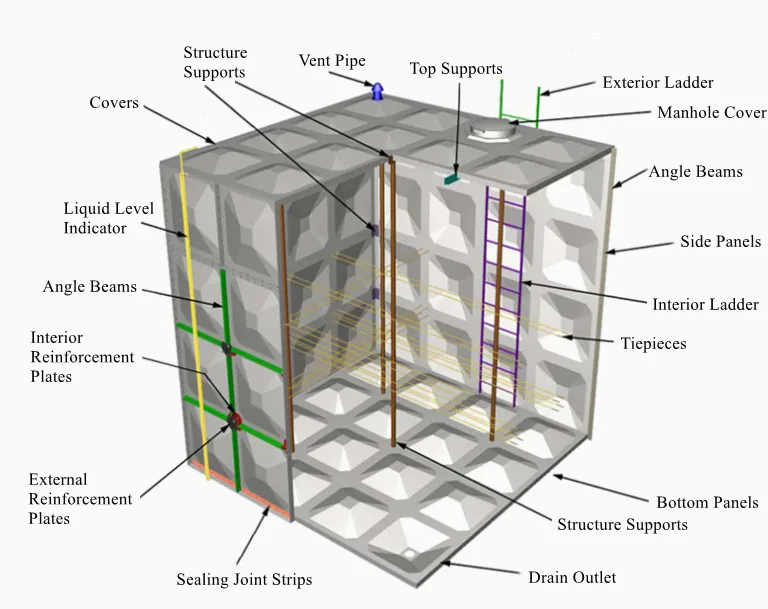loading...
- No. 9, Xingyuan South Street, Dongwaihuan Road, Zaoqiang County, Hengshui, Hebei, China
- admin@zjcomposites.com
- +86 15097380338
- Welcome to visit our website!
fiberglass storage tanks
Understanding Fiberglass Storage Tanks Benefits and Applications
In the world of industrial storage solutions, fiberglass storage tanks have emerged as a popular choice due to their remarkable durability, versatility, and resistance to corrosion. As industries increasingly focus on efficiency, safety, and environmental responsibility, fiberglass tanks have proven to be a reliable option for storing various liquids and materials. This article explores the benefits, applications, and considerations of fiberglass storage tanks.
What are Fiberglass Storage Tanks?
Fiberglass storage tanks are made from fiberglass reinforced plastic (FRP), which combines glass fibers with a polymer resin to create a lightweight, robust structure. This composite material offers exceptional strength and resistance to a wide range of chemicals, making it suitable for various applications, from water treatment to chemical storage.
Advantages of Fiberglass Storage Tanks
1. Corrosion Resistance One of the standout features of fiberglass tanks is their exceptional resistance to corrosion. Unlike traditional metal tanks that can rust or corrode over time, fiberglass tanks can withstand the harsh effects of chemicals, humidity, and temperature fluctuations. This property significantly extends the life of the tank and reduces maintenance costs.
2. Lightweight and Easy to Transport Fiberglass is considerably lighter than steel and concrete, making fiberglass tanks easier to install and transport. This lightweight attribute can lead to reduced installation costs and lower transportation fees, as well as less heavy machinery required for placement.
3. Customizability Fiberglass tanks can be manufactured in various shapes and sizes to meet specific industry needs. Whether it’s for storing water, oil, or other chemicals, these tanks can be tailored to accommodate various capacities and specifications, providing versatility that rigid metal structures may lack.
4. Environmental Safety Fiberglass tanks are often manufactured with environmentally friendly facilities and can contribute to sustainable practices. They are designed to prevent leaks, ensuring that contained substances remain secure and do not pose environmental hazards. Many fiberglass tanks are also recyclable, further enhancing their environmental viability.
5. Longevity and Lower Maintenance Thanks to their corrosion-resistant nature, fiberglass storage tanks typically require less maintenance than their metal counterparts. This longevity translates into significant savings for businesses, as they can avoid frequent repairs or replacements that can disrupt operations and incur additional costs.
Applications of Fiberglass Storage Tanks
Fiberglass storage tanks find applications across various industries, including
fiberglass storage tanks

- Water and Wastewater Treatment These tanks are widely used for storing and treating water in municipal systems. Their resistance to corrosive materials makes them ideal for application in harsh environments.
- Chemical Storage Many industries use fiberglass tanks for storing aggressive chemicals such as acids and solvents. The ability of fiberglass to resist chemical damage makes it a safe option for these applications.
- Agricultural Storage In agriculture, fiberglass tanks are utilized for storing liquids like fertilizers and pesticides. Their resilience helps ensure that agricultural operations run smoothly without the risk of leaks or contamination.
- Oil and Fuel Storage Fiberglass tanks are increasingly used for storing diesel, gasoline, and other fuels. Their design minimizes leakage risks, a crucial factor in preventing environmental damage and ensuring compliance with regulations.
Considerations When Choosing Fiberglass Tanks
While fiberglass storage tanks offer numerous advantages, it is essential to consider specific factors when choosing the right tank for your needs. These include
- Regulatory Compliance Ensure that the chosen tank meets local and federal regulations for storage, especially for hazardous materials.
- Temperature and Chemical Compatibility Verify that the tank material is compatible with the substances being stored and can handle the relevant temperature ranges.
- Installation and Maintenance Factor in the costs and logistical considerations associated with the tank’s installation and maintenance requirements.
Conclusion
Fiberglass storage tanks have revolutionized storage solutions across various industries due to their many advantages, including corrosion resistance, lightweight construction, customizability, and lower maintenance needs. As industries continue to evolve, these tanks provide a safe, sustainable, and efficient option for liquid storage, standing as a testament to modern engineering and environmental responsibility. Making an informed choice when selecting a storage tank can lead to significant operational efficiencies and long-term cost savings.
-
GRP Structures: The Future of Lightweight, High-Performance EngineeringNewsJun.20,2025
-
FRP Water Tank: High-Performance Storage for Corrosive and Clean Water SystemsNewsJun.20,2025
-
FRP Square Tube: The New Industry Standard for Chemical and Structural ApplicationsNewsJun.20,2025
-
FRP Pultruded Profiles: The Ultimate Choice for Lightweight Structural StrengthNewsJun.20,2025
-
FRP Handrails: The Safer, Smarter, and Stronger Choice for Modern InfrastructureNewsJun.20,2025
-
FRP Grating: The Smart Solution for Durable, Lightweight Industrial FlooringNewsJun.20,2025
-
Why Choose a Galvanized Water Tank for Your Storage NeedsNewsMay.21,2025
